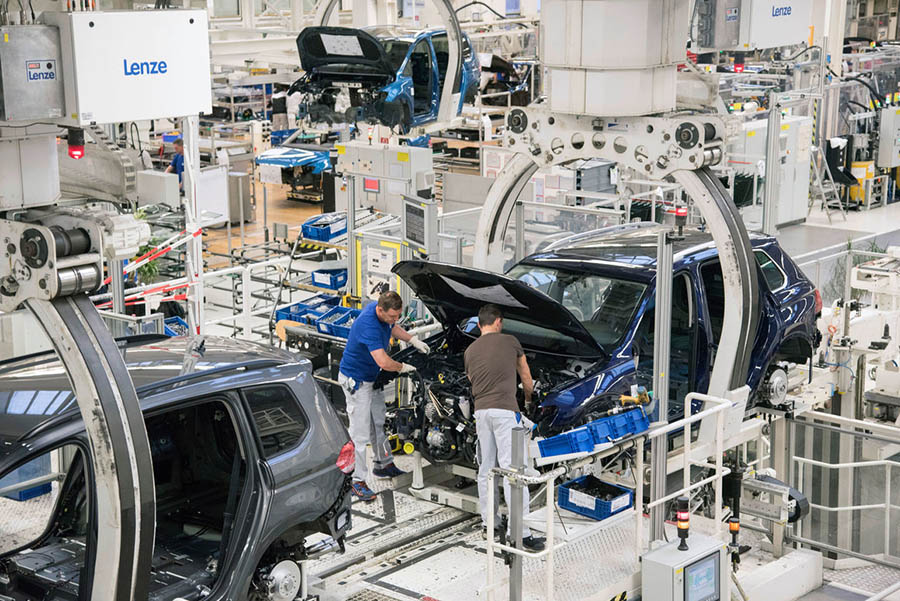The German automotive industry wants to become climate neutral – but open to technology and without stricter intermediate goals. VDA President Müller attacks the commission.

The German automotive industry criticizes the EU Commission’s plans to tighten the climate targets and warns of a deindustrialization of Europe. “With this new project, the short-term massive tightening of the CO2 targets, Europe is taking a path that is too risky,” said the President of the Association of the Automotive Industry (VDA), Hildegard Müller, to the Handelsblatt.
The automotive industry is striving for transformation. “But dirigistic interventions that make it impossible to achieve corporate goals do not go hand in hand without additional, painful job losses,” said Müller. “There has to be an honest discussion about this, and politics is responsible for that.”
She could not see “how the EU Commission wants to develop the continent into a lead market that combines climate protection and industrial policy,” said the head of the association. If the EU restricts itself to certain types of drive or enacts a large number of rigid targets, “then at some point the regulation no longer fits together and massively damages the industrial location”.
On Tuesday, the Vice President of the EU Commission, Frans Timmermans, will officially present the EU Commission’s climate protection plans to the European Parliament. The next day, Commission President Ursula von der Leyen will put her idea of the Green Deal into concrete terms. It provides for CO2 emissions to fall by 55 percent across the EU by 2030.
So far the goal has been a minus of 40 percent. In 2050, according to the plan, Europe should be the first climate-neutral continent. So far, CO2 emissions should have fallen by 80 to 95 percent. The tightening has consequences for the transport sector in particular. For years, it has been difficult for them to reduce their absolute emissions in view of increasing mobility – even if the energy efficiency of vehicles increases.
Now the EU plans provide for the limit values that manufacturers must comply with for their newly sold car fleets to be adjusted again. By 2030, emissions are not expected to drop by 37.5 percent as previously planned, but by half compared to 2021.
This should only succeed if the premium manufacturers primarily sell vehicles with electric drives. The EU Commission speaks of a “realistic scenario”, since the production and sale of e-cars is increasing and hydrogen offers a perspective for heavy commercial vehicles. At the same time, investments should be made in buses and trains, road tolls should be payable and smart mobility offers should facilitate the switch to climate-neutral means of transport.
While Chancellor Angela Merkel (CDU) has welcomed the Commission’s plans for a long time, Federal Transport Minister Andreas Scheuer (CSU) criticized it. “The balance must be kept between reason and tightening,” he demanded.
Ambitious goals are needed because they would bring innovation, but: “I believe that if you send the wrong signals to the world with exaggerated values, you would create uncertainty in the economy.” It doesn’t help “if a company closes its factory gates and cut thousands of jobs.”
Automobile President Müller pointed out that the industry, as the leading industry, is already “equipped with very ambitious climate targets in the form of fleet limits”. It is not about shifting responsibility for climate protection to other economic sectors.
But she made it clear: “It is regrettable that the EU Commission is obviously not taking into account the worsening economic situation in industry as a result of the corona crisis.” The crisis is making enormous demands on the economy, which is committed to the goal of becoming climate-neutral by 2050 be. “But we also have to talk responsibly about the capabilities of the various economic sectors,” Müller clarified. “We cannot arbitrarily tighten the climate targets.”
“Don’t give up openness to technology”
Rather, Müller called on politicians to underpin their own climate plans. “National politics and the EU Commission are obliged to explain what contribution they themselves are making to the success of climate neutrality.” For example, in the recovery plan of the EU states, the funds for expanding the infrastructure for electromobility have once again been significantly reduced. “Another example: Politicians have difficulties with laws to ramp up the charging infrastructure in the private sector.”
Indeed, the coalition has long been discussing how tenants are entitled to a charging station in front of the house or how it is easier for employers to charge them. Not only the economy has to deliver, also politics, demanded Müller. “Politicians are finding it difficult to consistently implement environmental and climate policy, both nationally and internationally.”
The automotive industry is very concerned about the fact that the Commission is focusing on the expansion of electromobility. It should not be forgotten that “there are bottlenecks not only in the charging infrastructure, but also in the battery cells,” warned Müller. “This shows that the political changeover cannot be easily managed either technologically or in terms of the necessary infrastructure.”
Therefore, Müller demanded: “We must not give up the openness to technology.” Anyone who wants to achieve the climate targets needs an open attitude towards modern combustion engines, hydrogen and e-fuels. The CO2 balance could also be improved in the short term with natural gas, LNG and other fuels.
Müller welcomed the Commission’s plans to include the transport sector in emissions trading in principle. “A market-based solution creates the best conditions to achieve the CO2 targets.”









